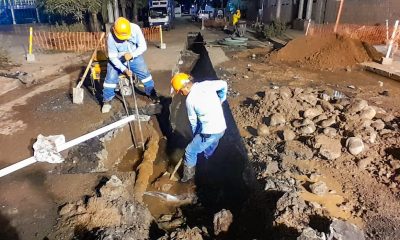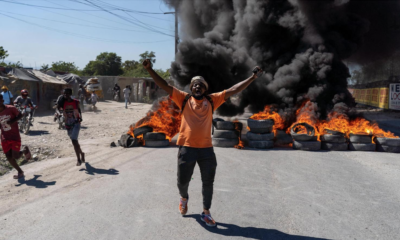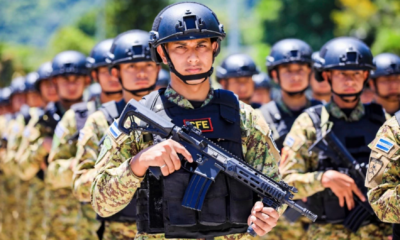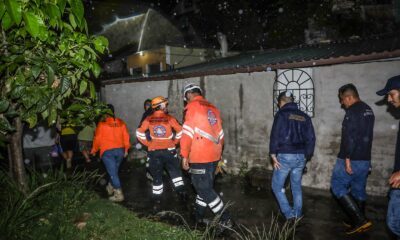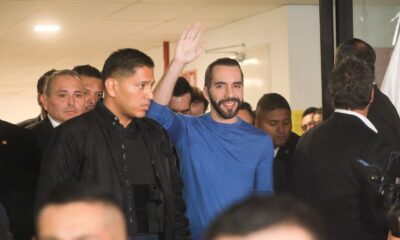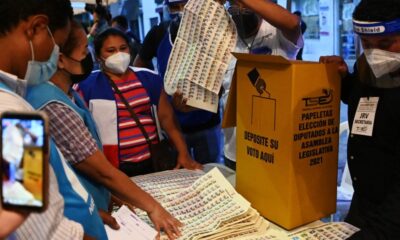Central America
Troops deployed in San Salvador amid massive gang crackdown
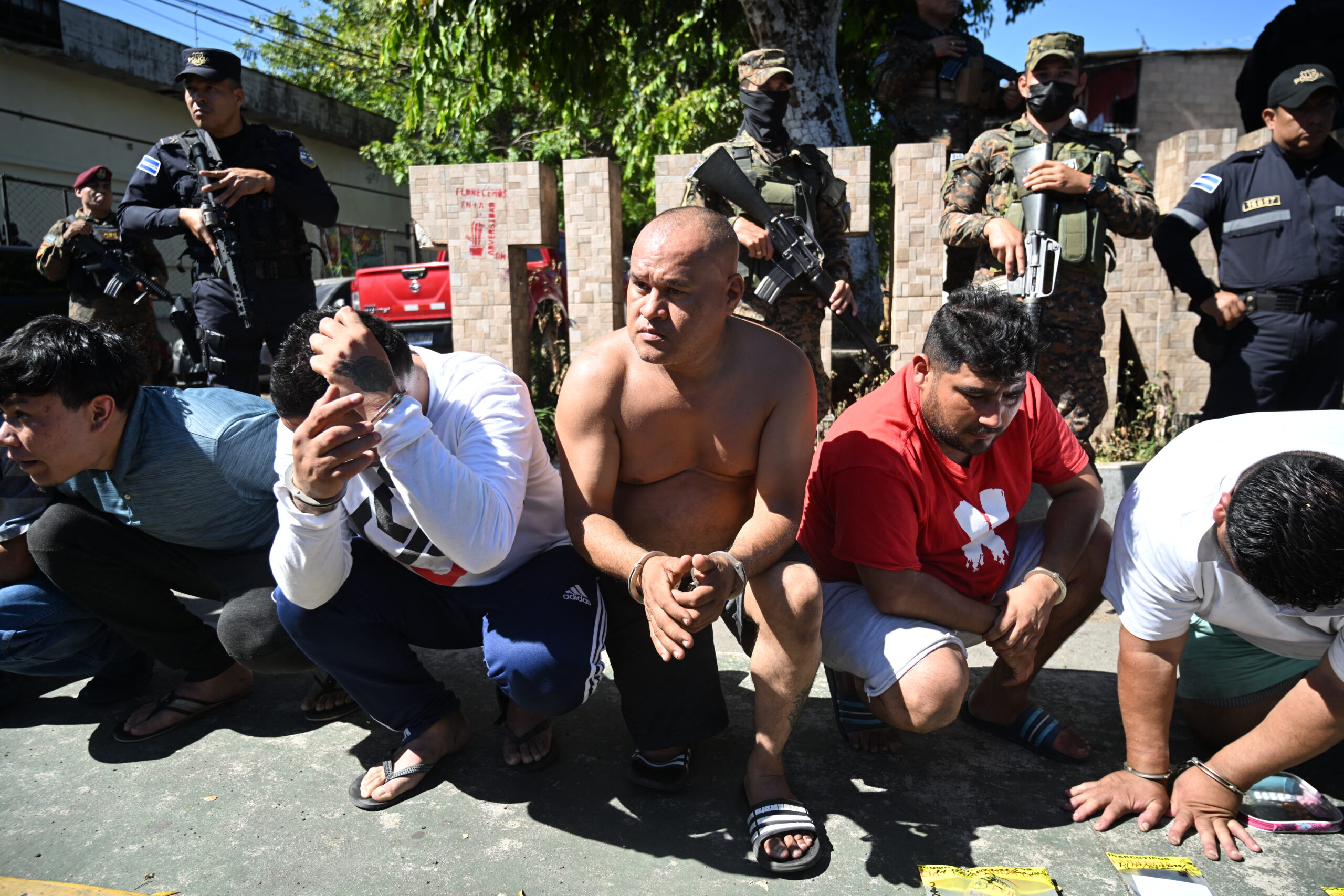
| By AFP |
More than 2,000 soldiers and police surrounded two districts in El Salvador’s capital on Saturday as part of President Nayib Bukele’s war on gangs, the second such operation this month in the Central American country.
“As of this morning, the Tutunichapa district in San Salvador is totally surrounded,” Bukele posted on Twitter.
“More than 1,000 soldiers and 130 police officers will extract the criminals who still remain,” he added.
Bukele later tweeted that 1,000 more soldiers and 100 police officers had been dispatched to La Granjita, another neighborhood in the capital.
“After encircling Tutunichapa, a famous drug distribution center, we knew that many drug traffickers would take refuge in the neighborhood of La Granjita, another famous distribution center”, Bukele tweeted.
Images released Saturday by the office of the president showed heavily armed soldiers entering Tutunichapa, a populous district where small houses mostly constructed of concrete blocks stand alongside one of the many polluted streams that run through San Salvador.
Justice Minister Gustavo Villatoro posted photos of members of an anti-narcotics police unit with drug-sniffing dogs.
“We are going to extract every criminal from our communities,” Villatoro said in a Twitter post.
‘Bastion on crime’
Defense Minister Rene Merino said 23 people had been arrested in Tutunichapa, without specifying whether they were accused of being gang members or drug traffickers.
“All terrorists, drug traffickers and gang members will be removed” from the area, Bukele said in another tweet, adding that until recently it was a “bastion of crime.”
“Honest citizens have nothing to fear and can continue to live their lives normally,” he wrote.
Local resident Edwin Diaz, 51, cheered the law enforcement action, saying the area has long been considered a dangerous place due to gang activity and drug sales.
“All our lives we have suffered the stigma that here there is drug dealing, gang members, bad things, and today with this security they have set up, there is nothing to fear,” Diaz told AFP by phone on Saturday.
Echoing Bukele’s remark, Diaz added: “He who owes nothing, fears nothing.”
Almost 60,000 arrests
Earlier this month, Bukele, who has declared a state of emergency to quash gang violence, sent 8,500 soldiers and 1,500 police officers to surround Soyapango, the country’s third-largest city, with a population of nearly a quarter million.
The president had announced last month a plan to use troops to surround cities while house-by-house searches are conducted for gang members. Soyapango was first on the list.
The siege there has seen armored military vehicles, some with artillery, carrying out constant patrols while heavily armed police search houses and people as they leave their neighborhoods, as well as random sweeps of public transport.
As of Saturday, some 650 suspected gang members had been arrested in Soyapango, Merino said.
“We continue working in the rest of the territory looking for terrorist criminals,” the defense minister added.
Almost 60,000 suspected gang members have been arrested since the launch of the state of emergency in March, which has prompted humanitarian groups to question what they see as heavy-handed tactics.
Despite that criticism, El Salvador’s Congress on Thursday once again extended the state of emergency for another month.
Over 75 percent of Salvadorans approve of the emergency declaration, and nine out of 10 Salvadorans say that crime “has decreased” with Bukele’s policies, according to a Central American University (UCA) poll published in October.
Central America
U.S. and Guatemala Sign Trade Deal Granting Zero Tariffs to Most Exports

The United States signed a reciprocal trade agreement with Guatemala on Friday, under which 70.4% of Guatemalan exports will enter the U.S. market tariff-free.
Guatemalan President Bernardo Arévalo highlighted the importance of the agreement, stating that it creates a framework of cooperation, certainty, and new opportunities for producers, workers, and entrepreneurs in the country. His remarks were shared in a video published on his official social media channels.
In 2025, 30.3% of Guatemala’s total exports were destined for the United States, amounting to approximately $4.3 billion. As a result, the agreement is expected to directly benefit key sectors of the Guatemalan economy, including agribusiness, manufacturing, and the textile industry.
“Today we have taken another step toward consolidating a country that, when it moves forward united, generates confidence, attracts investment, and creates real development opportunities for all its people,” Arévalo added.
The agreement with Guatemala follows a similar trade deal signed by the United States with El Salvador on Thursday, which includes the elimination of a 10% tariff on Salvadoran imports.
Central America
Panama Supreme Court Strikes Down Panama Ports Concession as Unconstitutional

Panama’s Supreme Court of Justice has ruled unconstitutional the concession contract granted in 1997 to Panama Ports Company (PPC), a subsidiary of the Chinese conglomerate CK Hutchison, which operates two strategic ports along the interoceanic canal. The decision was announced on Thursday, January 29, 2026, following two lawsuits filed by the Comptroller General’s Office.
The ruling directly affects the management of the ports of Balboa, on the Pacific coast, and Cristóbal, on the Atlantic side, both of which have been operated by the company for nearly three decades. According to Panama’s Comptroller General, Anel Flores, an audit uncovered irregularities in the contract that resulted in more than $1.3 billion failing to enter state coffers.
“It is a predatory contract, abusive to the interests of the country,” Flores stated.
The Supreme Court determined that Law 5 of 1997, its subsequent amendments, and the automatic extension granted in 2021 are unconstitutional. The ruling noted that the contract renewal took place without adequate oversight and amid allegations of corruption, despite the Panamanian state holding only a 10% stake in the company.
Central America
Guatemala President Says Starlink Terminal Found Inside Prison

Guatemalan President Bernardo Arévalo revealed on Tuesday that a Starlink terminal was discovered inside a prison in the country, highlighting corruption and the illegal introduction of advanced communication technology into the penitentiary system.
Arévalo did not specify which prison the device was found in but stressed that Starlink’s ability to connect directly to low-orbit satellites makes it particularly difficult to disrupt, posing a serious security risk.
The disclosure was made during a press conference attended by Interior Minister Marco Antonio Villeda and Defense Minister Henry Sáenz.
On January 6, specialized units of Guatemala’s National Civil Police (PNC), members of the Army and prison security personnel carried out Operation Sentinel at the Renovación 1 Maximum Security Prison for Men, located in Escuintla. According to the Interior Ministry, the operation aimed to reduce criminal activity, prevent illicit acts and stop the trafficking of prohibited items inside the prison.
During the operation, authorities also dismantled businesses operating near several prisons after detecting routers that were allegedly used to redirect internet signals into penitentiary facilities, according to local outlet Emisoras Unidas.
Tensions escalated further over the weekend of January 17 and 18, when inmates affiliated with gangs staged riots in three prisons. During the unrest, they took prison guards and a psychologist hostage, demanding extra-large beds, air conditioning, transfers to other facilities and access to the internet.
-

 International4 days ago
International4 days agoFootball Fan Killed in Clashes After Colombian League Match
-

 Central America4 days ago
Central America4 days agoGuatemala President Says Starlink Terminal Found Inside Prison
-

 International3 days ago
International3 days agoU.S. Senate Rejects Budget, Bringing Government Closer to Shutdown Amid DHS Dispute
-

 International4 days ago
International4 days agoRubio Says U.S. Could Participate in Follow-Up Russia-Ukraine Talks
-

 International4 days ago
International4 days agoMissing Spanish Sailor Rescued After 11 Days Adrift in Mediterranean
-

 Central America2 days ago
Central America2 days agoPanama Supreme Court Strikes Down Panama Ports Concession as Unconstitutional
-

 International3 days ago
International3 days agoStorm Kristin Kills Five in Portugal, Leaves Nearly 500,000 Without Power
-

 Central America2 days ago
Central America2 days agoU.S. and Guatemala Sign Trade Deal Granting Zero Tariffs to Most Exports
-

 International3 days ago
International3 days agoMan Arrested After Vehicle Crashes Into Jewish Institution in Brooklyn
-

 International3 days ago
International3 days agoTrump Says Putin Agreed to One-Week Halt in Attacks on Ukraine Amid Extreme Cold





























